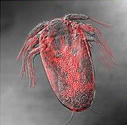Parasitology
Control of the of the salmon louse, Lepeophtheirus salmonis, is considered as a major problem for the salmon farming industry in Norway, as the parasite affects both farmed and wild salmonids. As a result of this challenge, a research centre for study of the biology of the louse has been established. This centre is connected to the FDR Group. In addition, the FDR Group performs research on the biology of microparasites (flagellates, microsporidia, myxozoa etc) that infect wild and farmed fish, including investigate studies of possible transmission of these between wild and farmed fish.

Main content
Several microparasites are affecting farmed fish and the survival and reproduction of wild fish. Costia or Ichthyobodo spp. has for many years been recognized as a problem for production of farmed fish world wide and has also been associated with mortalities in wild fish populations. The FDR Group has for many years been focusing on this problem and has as a result shown that ichthyobodisis is caused by several different species of Ichthyobodo where two different species are causing disease of Atlantic salmon in both fresh and sea water. Other species of Ichthyobodo are causing diseases of Atlantic cod, halibut, catfish, tilapia, pacific salmon and several other wild and farmed fresh water fish species. Microsporidians is another group of protozoans that are causing major problems in the aquaculture industry world wide. In 2008 a new species, Paranucleospora theridion, was discovered as a major pathogen of farmed and wild salmonids in western Norway. This parasite has a complex life cycle involving both salmonids (S. salar, S. trutta, O. mykiss) and salmon lice (L. salmonis and C. elongatus). P. theridion produces two different spores in the fish host and seem to be a major cause for PGI in the marine production of Atlantic salmon. The salmonids are infected by spores produced by salmon lice, and, hence, increased production of salmon lice on farmed salmon will also increase the production of this parasite. An important focus of the FDR Group is on characterization of the biology of P. theridion and the interactions with the fish hosts.

